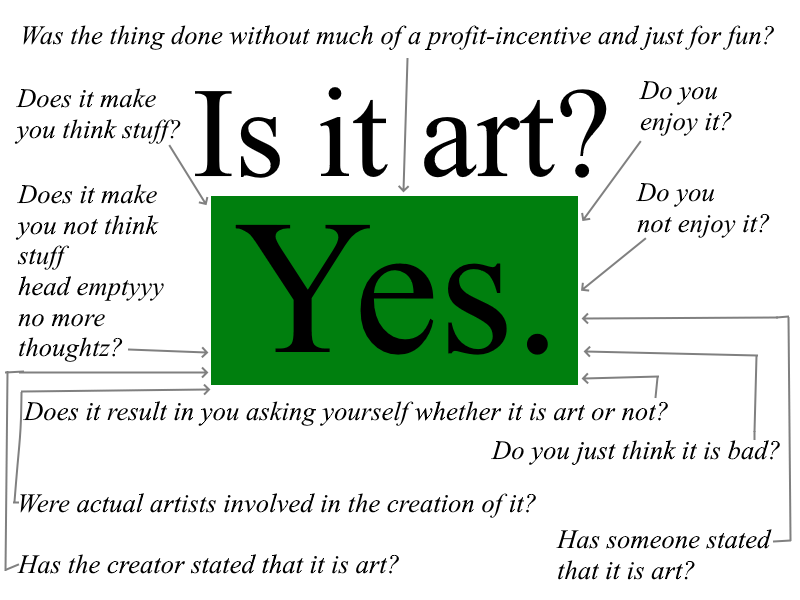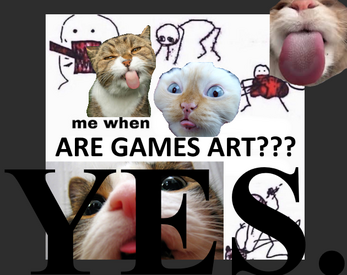ARE GAMES ART???
A downloadable hopethathelps
Henlo peoblez!!!
Welcome back to my (now apparently semi-regular!) series of very silly little texts, where I am reacting to frequently asked questions related to digital games. You can read this text here as a follow-up to my widely acclaimed(!) and infamous(!) text OMG, A Gen Z Nonbinary Gӕrl Single-Handedly Shifts Game Studies!!! and my very recent ramblings AGAINST PLUNDERCORE. Once again, as a practice to counteract the bad, clean and over-engineered texts and artworks that emerge from art schools and the pseudo-well-behaved and softcore-ironic habitus of the German literature scene etc that badly conceals its deeply rooted abusive practices, I just wrote this text yesterday and today, and will put it onto itch.io immediately!!! And no, you cannot do something to stop me!!!!!! BLEH :P
We all have met these people, we all have read ALL(!) of these papers posing the wonderfully sophisticated and innovative question: “Are games art?”. Some papers even DARE to vary on that question, stating that games are beginning(!!!!!!) to show signs(!!!!!!) of serious art(!!!111111!!111), or just writing about “art games”.
And what examples for these innovative artistic games do these papers offer? The same 5 multiple award-winning first-person walkers released 10 years ago. WOAH!!!!!!!! NO WAY!!!!!!!!!!!!! (YES WAY!!!!!!) I am always in tears at the sheer variety of these UNKNOWN NO-NAME GAMES when I read those papers that even reference eachother!!!! Truly magical!!!!
The short answer is: YES OF COURSE THEY FUCKING ARE!!!!!!!!!!
Now that you know the answer, you could leave this text if you like to, dear reader, and I wouldn’t mind it at all. Don’t we all love it when (academic) texts provide us with very clear and easily digestible answers? I certainly do!
* * *
Still here, still reading? Oh, well! Let’s dig just a little bit deeper, shall we?
I think these papers were written with the very best intentions in mind. In fact, I know exactly where these papers are coming from: They are coming from a well-meaning defensive mode, where they need to defend the medium of games against certain academicsTM, certain gamersTM, certain discoursesTM etc. I mean, art schools are also doing this all the time, where people – and especially marginalized voices – have to over-defend every single thing in their work all the time. And ~weirdly~, art by non-marginalized voices gets judged a bit less harshly, and the questions are less suggestive. (To give a very concrete example from studying Creative Writing: “Why are the characters gay and why do they do what they are doing? Where is the MEANING?” - And I’m like: Well, what does this mean? Does it need to mean anything? Can’t they just first and foremost exist there? I certainly also don’t make sense all the time, maybe even most of the time lol.) This general mode of always needing to defend oneself, whether in academic contexts or online or wherever, seems to create a sublimely threatening atmosphere of constant danger, which is harmful to art and in which all genuine artistic expression dies off. I see this in a general decline in truly visionary concepts, that I would link back to contemporary artists (especially on the political left) constantly anticipating being attacked (by conservatives, by the political right mostly, but also by the NEOLIBERAL WOKE BRIGADE!), and so they make sure to play it save all the time, thus reverting back towards already established aesthetics and discourses. It is very understandable, and I am well aware of these effects, but it appears to be detrimental towards genuine artistic expression. I do heavily consider my own art as more closer to what would normally be locked away in psych wards, burnt by “caretakers” and doctors, banished to be never seen again, and I really got lucky (and tried it so, so often back then!) to even be accepted into these universities at all lol – still doesn’t justify my experiences of abusive structures tho, and thus I am not a person to participate in this common anti-progressive mode of being nice and thankful all the time (and wearing a suit all the time).

With me, people don’t have to defend their art all the time, with me artworks are allowed to actually just be there, without any immediate need to be justified – because I trust in artists that they know what they are doing, even if I may not “like” a particular artwork and its broader implications, or “understand” it (as people know, I don’t buy into this whole interpretative “understanding” thing at all, it is utterly uninteresting to me whether I “understand” it or not), maybe then I am apparently just not the right audience. And if I would be in the position of being a teacher myself, and thus a delegate of epistemic and institutional violence, who would I be to overly judge art made by students at all? The softcore factory workers of neoliberalism who are happily paying a fee for their own exploitation instead of getting paid for even being there at all, always hustling, always delivering, always never good enough, always burning bright until ending up with quiet quitting (aka: students).
And the thing is: I even do write these “defensive” papers myself. And I also have written about more well-known games where the literature already exists. It’s easier to have a basis to jump off from, and it then feels legitimate, it feels justified, it feels as if you were less alone in your quixote-esk windmill-goliath-fighting quest for defending the medium yet again. But then I also make sure to mix it up with totally niche random games that I found sth striking about, or more “pop” games that are seemingly too uninteresting to be considered “serious” artefacts of academic interest within the respective little research area, but that are still surprisingly fitting for my interest. Or you have papers written primarily for university teachers who are kind of out of your specific research area, and to whose more popular artefacts might be more accessible (since sadly nobody usually reads these papers anyways, of course that’s also a valid reason for writing lol) – and related to that you might even have an audience totally from outside the field, who are really no gamers at all, and then you kind of need to figure out how to get them interested, and it’s like… uhh… yeah, I’ve already been there, most of the time even. The point being: I can understand why these papers were written, there could be a variety of reasons, and sometimes the reasons are actually just circumstantial.
And now, finally, to answer the actual question (don’t blame me, I told you earlier that you could stop reading already!!!): Are games art?
Let me start with a different question: What are for example OXO and Tennis for Two (the latter influencing the later development of Pong)? I consider them to be side-projects, “happy little accidents” of the violence of the Military-Industrial Complex. They were developed by these computer scientists, physicists, mathematicians etc apart from their actual job, as little demonstrations of their research, and probably because it’s just a little bit of fun.
These early games can be described as a simulated remediations of sports such as tennis or football/soccer – you have two parties needing to transport a ball into some sort of goal-area on the other side (oh Huizinga, oh Caillois!). This abstraction of sports is an act of artistic creation. Sure, the “graphics” were super bare bones to non-existent, but at this point in history it was the best that was possible, and A S Douglas and William Higinbotham (otherwise working on silly stuff like nuclear bombs) and Robert V. Dvorak were scientists first and foremost – when you look at early game prototypes of big-budget studios (some of which were posted online for example during one of the many leaks of GTA VI, it was one of the earlier ones, but maybe not the first leak, not sure which leak it was lol), or at many of the games that were developed by programmers, you can see that they are oftentimes without much graphical fidelity. And I still think they are works of art, even without the super-graphical surface. And people shouldn’t always get distracted by the shiny shiny shiny stuff (but also please get distracted by the shiny shiny shiny stuff).
Is it art when David Lynch cooks Quinoa? - Yes.
Is it art when Andy Warhol films a blowjob? - Yes.
Is it art when Salvator Garau sells an “invisible statue”, or when Maurizio Cattelan tapes a random banana onto a wall? - Yes, but it’s also an obvious scam lol.
I would organize art along a scale of profit-incentive. On the one end you have “products” or “entertainment” done for profit, on the other hand you have “art done primarily for the art itself”. But still, “products” and “entertainment” would fall under the wider umbrella of “art”. It seems that a lot of this “Are games art?”-discourse also stems from people thinking that AAAAAAAAAAAAAAAAAAAAA-games disqualifying as art entirely, since they are “products”/“entertainment”, but which to me still makes them art, albeit maybe bad art lol, depending on the person you are asking.
And here is a thing:
AS AVANT-GARDE ARTISTS, WE ALWAYS NEED TO BE SOMEWHERE ELSE. THIS IS THE DEFINITION OF THE AVANT-GARDE. WE ALWAYS NEED TO STAY ON THE MOVE. AND WE MOVE INTO THE POLAR OPPOSITE DIRECTION OF THE INEVITABLE PROCESSES OF CAPITALIST COMMODIFICATION AND MAINSTREAMIFICATION. ALWAYS ON TOP OF THE GAME, ALWAYS ON THE HUNT. EVERY PROPER AVANT-GARDE ART PRACTICE MUST THUS BE A SELF-DESTRUCTIVE ONE, BECAUSE CAPITALISM SURELY WILL SOONER OR LATER DEVOUR IT.
And here is another thing:
The contemporary NEOLIBERAL WOKE BRIGADE will say: “Well, isn’t that too apodictic? I want to stay soft and comfy and hug everyone”. - And I tell you: You cannot fight capitalism (and its INEVITABLE transformation into fascism, its most logical conclusion and final destination) by giving away free hugs. The girls are fightinggg on Social Media, retruthing their Xs and x-ing their truths, and what are you doing? (Maybe writing a thing from afar, just like me, oh well :3)
The whole thing with YouTube analysis videos & pseudo-smart video essayists and commentators (woah they just like me fr fr) who pop up nowadays, oftentimes sharing undercomplex right-wing sentiments against WOKE PRONOUNS in video games, and who apparently do not have the proper education for a more nuanced take than “pronouns baaaaad babyface babyface”, has really been detrimental to the online discourse & also to art, in my view. This kind of “democratization” (on Social Media platforms designed by what Ken Klippenstein has called the “Appistocracy“, but which I view as just the very very very unsurprising views of these exploitative Silicon Valley capitalists) has brought its own flaws, and the political right has weaponized those flaws. And I consider this whole analysis and interpretation framework as a quite conservative outlook on art, that is sadly common as well within the NEOLIBERAL WOKE BRIGADE – it is the over-defensive mode yet again.
My parents were raised in the GDR, or may I even say: indoctrinated, and the current discourse heavily reminds me of them. When it comes to art, they were always asking for a concrete meaning. Under the SED doctrine of “Socialist Realism” (which I think wasn’t too far from the understanding of art in Nazi Germany that lead to the fight against so-called “degenerate art”), everything had to have a very concrete meaning towards a (socialist?) ideology, and the GDR fought against certain artists as well, which was yet again oftentimes just abstract art that escaped the narrow ideological frameworks of these governments. So, to me it is an anti-fascist mindset to not over-analyse, over-explain art that speaks for itself. ABSTRACTION IS ANTIFA. One could even dare to note the bold take that these YouTube video essays of over-analysing are an early sign of a shift towards fascism, or at least a more prude culture that doesn’t let things (artworks) just be. When capitalism has devoured all of our lives and cultures already, it still needs to devour more and more and more and more, and make sure that people aren’t resisting all that much. So no, I don’t wear a suit, and I don’t say thank you. When encountering more abstract paintings, I am not interested in over-explanation of what it all means. I might be interested in hearing personal anecdotes instead on how the work was made, or some additional thoughts, and the time period and so on. But not in that kind of analysis. There are indeed very interesting analytical writings tho, and I do consider them if they are specifically helpful, and especially those written by the artists themselves – and in some cases those are even more important to read than the actual artwork. But first and foremost I let the artwork speak for itself. I have a lot of trouble with spontaneous verbal communication, and I know that not everything/everyone can speak all the time. I heavily appreciate not talking to people, but letting the art speak instead, and maybe it speaks outside of the forced circumstances of institutional or academic curation. And when it doesn’t speak to me, then it doesn’t speak to me.
I would like to end this text by providing a little diagram in order to hopefully answer this question once and for all!!! Hope that helps!!!

Okay, cool!!! Question solved!!! Can we please meow on now??? Thanku :3
| Status | Released |
| Category | Other |
| Rating | Rated 5.0 out of 5 stars (1 total ratings) |
| Author | luka |
| Tags | academia, art, game-studies, text, Text based, theory |
Download
Click download now to get access to the following files:

Comments
Log in with itch.io to leave a comment.
Very good read. I've actually went into a deep rabbit hole trying to make sense of this whole thing a year and a half ago after some less than ideal events happened in my life, and also reached some of the same conclusions...this also gave light on some points which are a really good complement to what I researched back then and I didn't think about, or simply couldn't think about because they're not part of my personal life experience. Thank you for writing this!
Oh great, thank you! I'm super glad that helped!!! And sorry for these "less than ideal events" - I guess it really is true that one can learn from all the very very sad and bad things that happen.